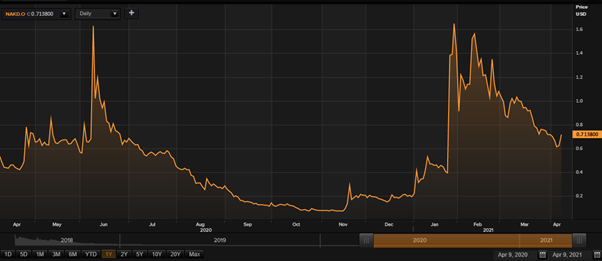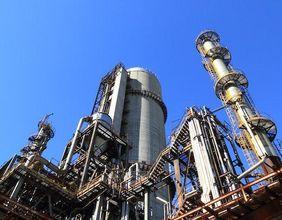Source: Kris Patrick, Shutterstock
Stocks of Naked Brand Group Limited (NAKD:US or NASDAQ: NAKD), an apparel and accessories firm, zoomed as much as 21.40 per cent in the early trading hours of Friday, April 9. This surge came after Ault Global Holdings (NYSE:DPW), a diversified acquisition company, announced that it holds a 6.41 per cent passive interest in Naked Brand.
On March 29, the consumer cyclical firm boosted its balance sheet by raising capital financings worth US$ 270 million. The company also stated that it has eliminated all of its pending debt obligations.
Let us look at this rising apparel stock’s performance:
Naked Brand Group Limited (NAKD:US or NASDAQ: NAKD)
The company sells most of its products through e-commerce across the US, New Zealand, Australia, and Europe. It derives maximum revenue from New Zealand.
The US-based firm’s stock was trading at nearly US$ 0.70, with a massive intraday volume of 123 million shares against its average 10-day volume of 60 million at 10:43 AM ET on Friday.
It has returned approximately 280 per cent this year, beating the S&P Apparel, Accessories & Luxury Goods (Sub Industry) Index, which is up 185.36 per cent relatively.
At beginning of this year, Naked Brand stock hit US$ 3.40 stock price amid the Reddit rally. Its 52-week low of 0.0661 per common share was recorded on October 26, 2020. The stock is still up 1,002 per cent against last year’s low.

Naked Brand's One-Year Stock Performance Chart. (Source: Refinitiv)
Penny stock traders have resumed their love for this luxury stock as the company has no unresolved debts, and on top of that, it has solidified its available cash reserves through multiple fundraisings.
However, at the previous close stock price, it was trading down by 33.52 per cent from its 60-day simple moving average (SMA), as per Refinitiv data, which indicates a short-term bearish trend. But in the long-term, it is up 32.14 per cent above its 200-day SMA. Hence, it could regain its uptrend.
The above constitutes a preliminary view, and any interest in stocks should be evaluated further from an investment point of view.





